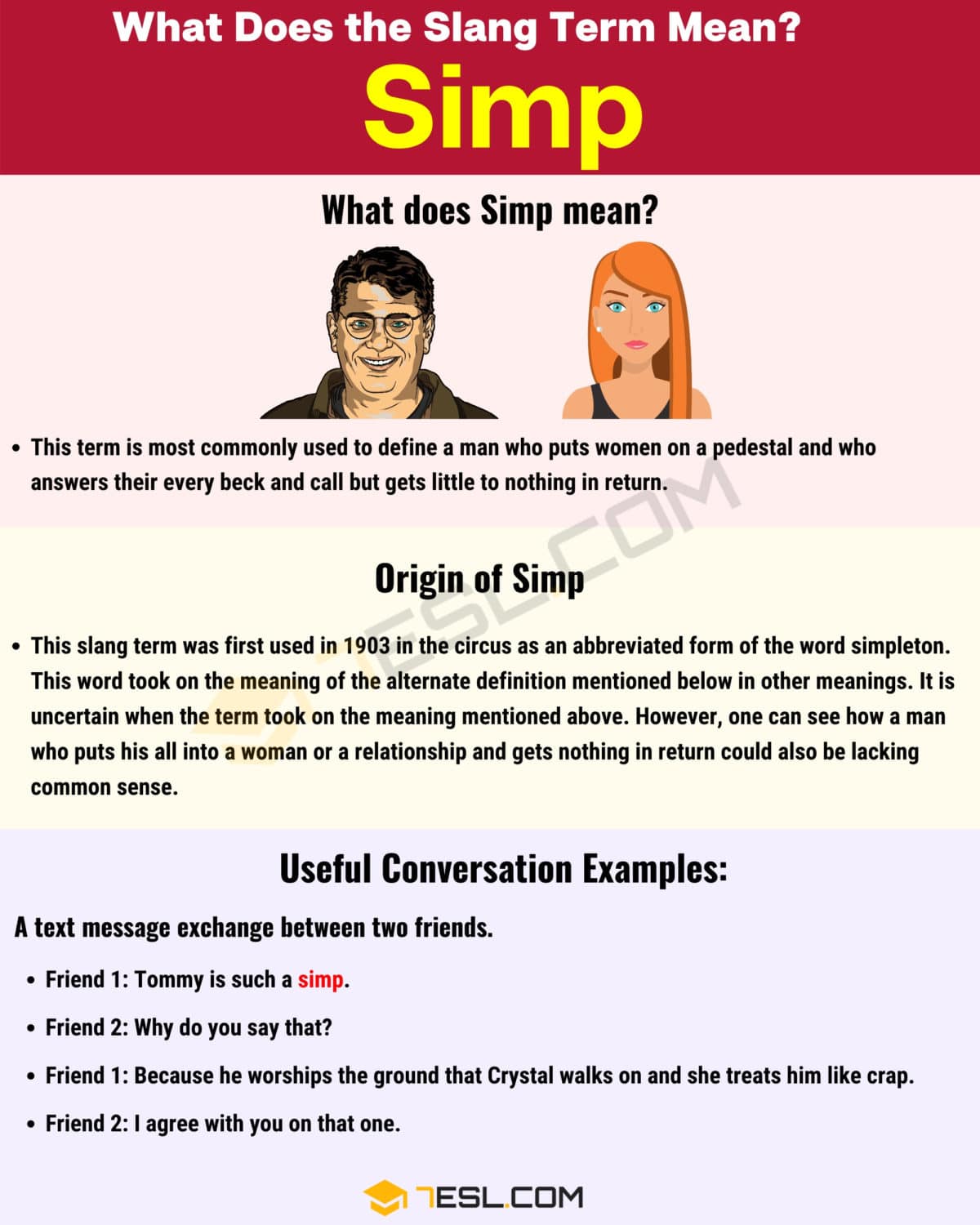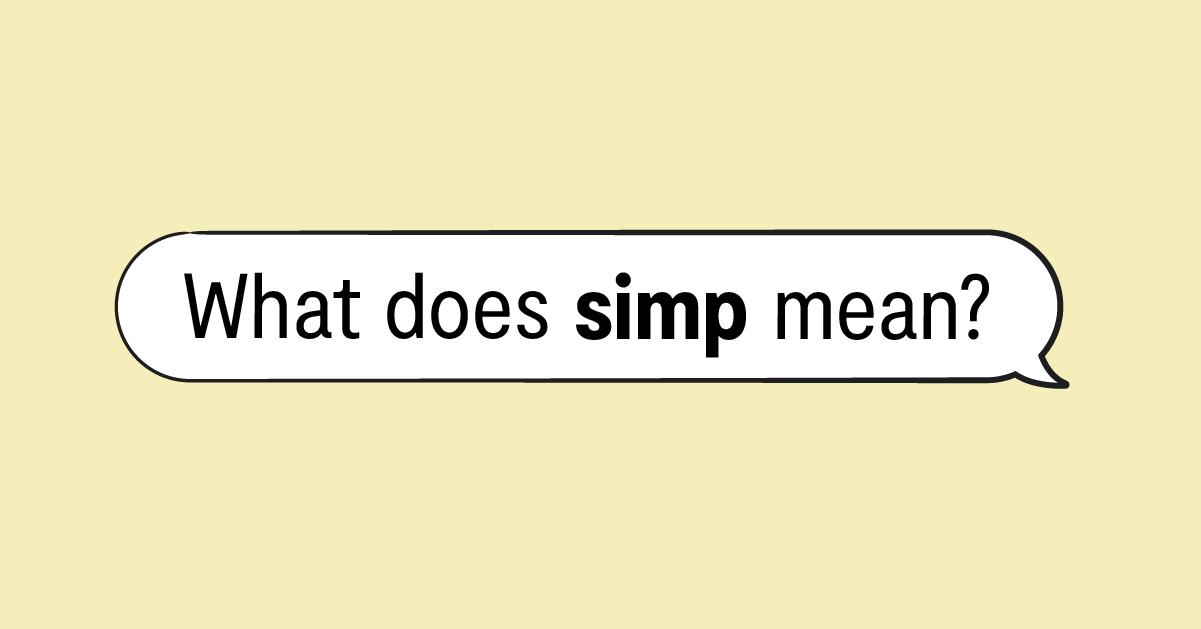Is "simping" just a harmless expression of affection, or does it represent something more concerning? The pervasive use of the term, particularly among younger generations, suggests a complex interplay of societal expectations, evolving definitions of masculinity, and the ever-present influence of social media.
The digital age has ushered in a new lexicon, a constantly evolving collection of slang terms that reflect the shifting landscape of human interaction. Among these, "simping" has emerged as a particularly potent and often debated word. It's a term that's been around for decades, a shortened form of the phrase "simpleton," meaning fool or silly person but has gained significant traction in recent years, particularly online. It is primarily used online, particularly on social media platforms like Twitter and TikTok, to criticize and mock individuals who try hard to win over someone else, but never find reciprocation. The term itself has morphed, its meaning transformed over time.
At its core, "simping" describes someone who shows excessive sympathy and attention toward another person, typically in pursuit of affection or a sexual relationship. It often involves actions like excessive spending, constantly messaging or pursuing someone, and neglecting one's own needs and values in an attempt to gain attention or approval. The act of simping looks different for everyone, but a simp is someone who is excessively sweet and submissive to impress or win over someone. The goal is to try to impress them or to win them over. In other words, it is the modern-day equivalent of being "whipped" or the "nice guy," but with a distinctly Gen Z flavor.
- Moms Inspiring Journey Beverly Aikins Jd Vance Discover Now
- Explore Marisha Ray Bio Roles More Your Guide To The Star
The rise of "simping" can be traced, in part, to the trends that have emerged on platforms like TikTok. The videos often depict young men lavishing attention and gifts on women, sometimes with a humorous, self-deprecating tone, and sometimes with an underlying sense of desperation. The viral nature of these trends has led to widespread adoption of the term, not only among those who are being accused of "simping" but also among those who are doing the accusing. It's a dynamic that mirrors the larger trend of using social media to both observe and participate in the performance of relationships.
While the true meaning of "simp" is far less exciting than some internet theories might suggest, it's worth noting that the term often carries a negative connotation. It can be seen as a sign of weakness, a lack of self-respect, or an unhealthy obsession. The Urban Dictionary, a popular online dictionary of slang, exemplifies this. Simping becomes problematic, however, if you allow yourself to be taken advantage of. Simping does become problematic, however, if you allow women to walk all over you solely because you\u2019re hoping your nice guy act will ultimately get you laid. Being a doormat simply is never a solution. This is especially true if the actions come at the expense of one's own well-being or self-worth. The act of simping, as described above, is a form of admiration, but it can also involve excessive spending, constantly messaging or pursuing someone, and neglecting your own needs and values in order to gain their attention or approval.
The use of the term "simp" also raises broader questions about the dynamics of gender and power in contemporary society. Some argue that the term is a misogynistic insult used to shame men for expressing affection toward women. Others see it as a form of social commentary, a way of critiquing traditional notions of masculinity and the pressures placed on men to conform to certain expectations. Moreover, the term, particularly in the context of celebrities or figures, it can refer to a type of admiration. Like with most slang terms, simp continues to evolve and its meaning will inherently depend on context and personal perception. Instagram has more 600,000 posts tagged #simp, and there are facebook groups devoted to simps and simping.
- Kaitlin Olson The Olsen Twins Fact Vs Fiction Family Secrets Revealed
- Alice Rosenblum Tiktok More Latest News Updates
Ultimately, the evolution of the word "simp" reflects the constant flux of language and culture. It highlights the challenges and opportunities presented by social media, the ways in which we communicate, and the ongoing search for meaning in a rapidly changing world. One thing is certain: as long as there are relationships, desires, and the constant performance of self, the term "simp" will likely continue to evolve and remain a part of the ever-changing digital vernacular.
The definition, example, and related terms listed above have been manually compiled and written by the slang.net team. We are continually updating our database with new slang terms, acronyms, and abbreviations. From a historical viewpoint, the word is a shortened form of the phrase \u2018simpleton\u2019, meaning fool or silly person. The word isn\u2019t new. In fact, it\u2019s pretty old. But it has been dragged into fresh popularity. In the same way that older songs can find new audiences on tiktok, older slang emerges. Simping, meanwhile, is a verb describing the action of being a simp.
The question then becomes, is simping the problem, or is shaming a man for being decent to a woman regardless of whether she will have sex with him the problem? The meaning of the word simp can be interpreted as an insult or a compliment. Used on tiktok, a simp is a man who does nice things for a girl they like. Many of us are familiar with the jokes about whipped husbands or phrases like nice guys finish last. but these nice guys now have a new insult to contend with: The term simp has been around for decades and some how white people used and abused it so much within a month it lost all meaning.
The term "simp" has also sparked debate about the differences between genuine affection and unhealthy obsession. Is there a line between being supportive and being a "simp"? Does the intention behind the action matter, or is it solely defined by the perception of the recipient? These are complex questions, and the answers will vary depending on individual perspectives and the specific context of the situation. You can be a simp if you are a person investing effort in someone else, or you can be simping on someone.
An example of a simp is someone who constantly gives gifts and compliments to someone they like, despite not receiving attention back. Someone [who does] [way too] [much] for a person they like. The words top entry on urban dictionary uses this conversation as an example: "Ive been simping over this guy whos in my math class all year. Im trying to be brave enough to ask him out before summer starts. Hes really simping for her. He carries her backpack around for her all day and brings her a coffee every morning. He is being way too much of a simp right now. The act of simping looks different for everyone.
The evolution of the term "simp" has sparked discussion, raising questions about gender dynamics, societal expectations, and the evolving nature of relationships in the digital age. It has become a part of the internet culture. The slang term is used to describe someone, especially a man, who excessively praises, idolizes, or showers attention on a woman in hopes of gaining her affection or approval. In old money, it basically means you\u2019re whipped.
- Karoline Leavitt Age Youngest Wh Press Sec And More
- Melina Goransson Twitch Streamer Destinys Wife Amp More


